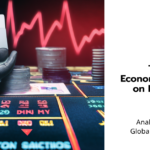
Decoding the Influence of Natural Resources on Forex Markets
- Jonny Smith
- July 31, 2023
- Forex Trading For Beginners, Forex Trading Strategies
- Best_forex_broker, ECN_Forex, forex_brokers, Froex_Demo_Accounts
- 0 Comments
Introduction
Close your eyes and imagine a colossal, bustling marketplace that never sleeps. A marketplace where every currency from every corner of the globe is up for trade. It’s a world that thrives in the depths of complex financial algorithms and the highs of billion-dollar deals. That, dear readers, is the world of Forex markets – a fascinating financial landscape that’s as complex as it is intriguing.
Now, introduce this ecosystem to Earth’s natural resources, the oil, the gold, the timber, and a vast array of commodities that we use daily. How do these tangible elements influence the digital numbers blinking on a trader’s screen halfway across the globe? If you’re scratching your head, you’re not alone. And guess what? We’re about to untangle this fascinating thread and explore how natural resources impact the Forex markets. So, buckle up and enjoy the ride!
Understanding the Basics
Forex Markets: Unveiling the Beast
To dive into the world of Forex or foreign exchange markets, think of it as a colossal currency supermarket. Here, you can pick a currency, say the US Dollar, and buy it using another, let’s say the Euro. These transactions influence the exchange rates – the price tags on these currencies, if you will. The higher the demand for a currency, the higher its price, and vice versa.
These markets are the beating heart of the global economy, powering international trade and investments. If you’ve ever travelled abroad and exchanged your home currency with the local one, you’ve dabbled in Forex, albeit at a very basic level. Now, magnify this to a global scale, and you can see why the Forex markets are such a big deal.
Natural Resources: Nature’s Gifts to Economies
At first glance, natural resources are simply the physical elements we derive from Earth – oil, gas, gold, fertile soil, forests, and even the wind and the sun. But dig deeper, and you’ll find that these resources serve as the cornerstone of global economies.
Every resource has a part to play. Precious metals like gold and silver act as a hedge against inflation and economic uncertainties. Oil and gas power industries and transport, forming the backbone of modern civilization. Even agricultural products, from the food we eat to the cotton in our clothes, are vital cogs in the economic wheel.
Unravelling the Link between Natural Resources and Forex Markets
The Economic Dance
Just as a talented dancer sways to the rhythm of the music, so does a country’s currency dance to the tune of its economic health. If a country has a bounty of valuable natural resources, it can flex its economic muscles, leading to a more robust currency.
Let’s take a trip down memory lane to those often-dreaded economics lessons about the balance of trade. When a country exports more than it imports, it enjoys a trade surplus, and generally, its currency tends to strengthen. This equation puts resource-rich countries in a favourable position. They can export their natural resources, tip the trade balance scale in their favour, and voila – their currency gets a power-up in the Forex markets!
The Drama of Supply and Demand
In the grand theatre of economics, supply and demand are the lead characters. When a resource is in high demand and short supply, its value soars. This increase can lead to a stronger currency value in the Forex markets. But it’s not just about the numbers; there’s an element of drama too.
Just like in a good play, international politics often adds a twist to the story. Trade agreements, embargos, and disputes can change the demand and supply dynamics, leading to wild swings in the Forex markets. It’s like an economic thriller movie, with currencies rising and falling in real-time.
Case Studies: The Plot Thickens
Oil and the Forex Market
Consider oil – a resource so valuable that it’s often called ‘black gold’. Countries with substantial oil reserves, like Saudi Arabia, Russia, and Canada, often find their currencies living out a real-life drama on the Forex stage. When global oil prices skyrocket, these currencies often rise. When oil prices plunge, these currencies might feel the pinch.
Consider the time when the Organization of Petroleum Exporting Countries (OPEC) decided to cut oil production to prop up prices. This decision sent tremors through the Forex markets, impacting the currencies of OPEC nations.
Gold and the Forex Market
Let’s shift our attention to gold, the age-old symbol of wealth and prosperity. Countries like South Africa and Australia, which boast significant gold reserves, often find their currencies impacted by the whims of the gold market. When global gold prices soar, the South African Rand and the Australian Dollar often get a boost.
Even during times of economic uncertainties or instability, gold often shines bright. It’s considered a ‘safe haven’ asset, and investors often flock to it during troubled times, causing an indirect impact on Forex markets.
Agricultural Commodities and Forex
Natural resources aren’t just about shiny metals and fossil fuels. Agricultural commodities like wheat, corn, soybeans, and coffee play their part too. Take Brazil, for instance. It’s a leading producer of coffee and soybeans. So, when these commodity prices fluctuate due to reasons like weather conditions or crop diseases, the Brazilian Real often rides along on the Forex roller-coaster.
Current Trends and Future Projections
Current Trends
In the world of Forex, change is the only constant. Recently, we’ve seen the disruptive effects of the COVID-19 pandemic and climate change on natural resources and, consequently, on Forex markets. The lockdown measures affected mining and drilling operations, while unpredictable weather patterns impacted agricultural yields.
These disruptions sent shockwaves through the Forex markets. For instance, the Russian Ruble took a hit when global oil demand plummeted during the pandemic. On the other hand, the Australian Dollar rode the wave of rising gold prices as investors sought safety in the yellow metal.
Future Projections
Looking ahead, the Forex markets are poised for a whole new chapter. As the world gradually moves towards renewable energy, commodities like solar and wind power are set to play a bigger role in economies and, by extension, Forex markets.
Climate change, the daunting spectre looming over our planet, is set to rewrite the rules of the game. As it impacts natural resources, from changing rainfall patterns affecting agriculture to melting polar ice caps affecting oil drilling, its effects on Forex markets will be profound.
Deep Dive: The Market Forces at Play
Oil: The Currency Influencer
While we have already introduced oil as a critical player in the Forex markets, it’s crucial to understand how exactly it pulls the strings. Let’s take a closer look at the oil-rich nations.
The Canadian economy, for instance, is heavily reliant on its oil exports. When global oil prices are bullish, the Canadian economy benefits from increased revenues from its oil exports. This economic strength often translates to a stronger Canadian Dollar in the Forex markets.
Now imagine a scenario where oil prices crash, like what happened during the 2020 COVID-19 pandemic. As the world went into lockdown, the demand for oil fell drastically. The sudden drop in oil prices put a strain on oil-dependent economies, and this weakness was reflected in their respective currencies’ values in the Forex markets.
The same principle applies to other oil-rich countries like Russia, Norway, and Saudi Arabia. These countries see their currencies’ fates intertwined with the rollercoaster ride of oil prices.
Gold: The Safe Harbour
Gold has held a unique place in human history. It has triggered conquests, adorned the powerful, and even caused market crashes. In the context of Forex markets, gold often plays the role of a safe harbour – a place where investors park their money during economic storms.
Consider Australia, a country with abundant gold reserves. When global markets are in turmoil, investors often flock to gold, pushing its price up. This increase in gold prices positively impacts the Australian economy, and this economic uptick is often mirrored in the value of the Australian Dollar in the Forex markets.
Agricultural Commodities: The Unseen Players
It’s easy to overlook the role of agricultural commodities in the world of Forex, but doing so would be a mistake. The price of these commodities can often have a profound impact on the currencies of agricultural-based economies.
Let’s look at the humble coffee bean. For countries like Brazil, a leading coffee producer, coffee is more than just a morning pick-me-up. It’s a significant part of the economy. When coffee prices rise, the Brazilian economy benefits, and this can lead to a stronger Brazilian Real in the Forex markets.
The same applies to other agricultural commodities like wheat, corn, and soybeans. Countries like the United States, Argentina, and China, major producers of these crops, often see their currencies’ values in the Forex markets influenced by the global prices of these commodities.
Looking Ahead: Charting the Future Course
As we stand at the cusp of a new era marked by sustainability and environmental consciousness, the traditional dynamics of Forex markets are set to undergo significant shifts.
Renewable Energy and Sustainable Farming
As the world moves away from fossil fuels towards renewable energy, commodities like solar and wind energy are set to gain prominence. Countries with abundant renewable energy resources could find their currencies benefiting from this global shift. Similarly, sustainable farming practices could lead to a rise in the value of organic agricultural commodities, impacting the Forex markets.
Climate Change: The Wild Card
Arguably the most significant challenge facing humanity today, climate change could redraw the Forex landscape. As changing weather patterns impact agriculture, countries that adapt and thrive could see their currencies strengthen. On the other hand, countries that fail to mitigate the impacts of climate change could see their currencies weaken.
In conclusion, the fascinating interplay between natural resources and Forex markets is a complex, multi-faceted narrative full of intriguing twists and turns. It’s a saga that will continue to unfold as the world evolves, presenting both challenges and opportunities for those willing to understand and navigate this intricate dance. And in this ever-changing world, knowledge, as they say, is power! So, here’s to a journey of learning, understanding, and making sense of the fascinating world of Forex and natural resources!








